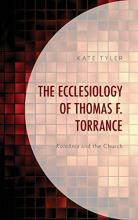Kate Tyler, The Ecclesiology of Thomas F. Torrance: Koinonia and the Church (Lanham, Maryland: Lexington Books/Fortress Academic, 2019)
Tyler, Kate. The Ecclesiology of Thomas F. Torrance: Koinonia and the Church. Lanham, Maryland: Lexington Books/Fortress Academic, 2019
Compare #2020-KT-1 and its companion video.
This book provides a constructive analysis of Thomas F. Torrance’s ecclesiology. Holding the doctrine of the Trinity to be the “ground and grammar of theology,” Torrance viewed the doctrine of the Trinity as foundational for all ecclesiological reflection: What does it mean to be the people of the God whom Christians name as Father, Son, and Spirit? Tyler examines Torrance’s development of the rich potential of the metaphor koinonia, involving both a vertical dimension––the Church’s union with Christ through the Spirit––and a horizontal dimension––its visible existence in human history, lived out in space and time, and considers how the relationship between these two dimensions informs the structured forms of the Church’s life, its ecumenical breadth, and its missional vision.
Cover blurbs:
Kate Tyler engages partly in a theological autobiography of Thomas Torrance, one of the twentieth century’s most important theologians, but more importantly she seeks to demonstrate Torrance’s unique Trinitarian approach to ecclesiology and how Torrance can be a resource for renewing the concept of communion, ecumenism, and ecclesial life today. Well-written, insightful, and useful for anyone interested in Torrancian theology or current issues in ecclesiology today. (Michael F. Bird, Ridley College)
Kate Tyler has written a superb monograph. Rigorous in its reading of Torrance and demonstrative of the richness of his Trinitarian ecclesiology, Tyler’s study unfolds with great nuance the benefits of Torrance’s ecclesiology from above. Students of Torrance in particular and of Christian doctrine in general will benefit from engagement with this wonderful work. (Christopher Holmes, University of Otago)
In this admirable book, Kate Tyler offers the first full-length discussion of Thomas F. Torrance’s Trinitarian ecclesiology. She persuasively and consistently demonstrates the difference it makes for theology, church structure, ministry, sacraments and the church’s relations with Israel, and when the church is understood as grounded in the Trinity and not in its ecclesial structures, important as they are. Such theology is thoroughly realist while avoiding all forms of monism, dualism, and subjectivism. In this perspective, the church is understood as ‘the empirical body of Christ, viewed both in the light of God’s economic work through the Son and Spirit, and in the light of who the eternal God is in his own being.’ Implications of Torrance’s ecclesiology are helpfully presented in Tyler’s discussions of Moltmann, Tanner and Zizioulas, which are sure to generate interest. This book, which deserves to be widely read and discussed, forcefully illustrates the great potential for ecumenical dialogue when the church is understood as grounded in the eternal Trinity, a hallmark of Torrance’s theology. (Paul D. Molnar, St. John's University)
The doctrine of the church was always a central concern for Thomas F. Torrance, particularly in the context of the ecumenical dialogues in which he was involved. In this valuable study, Kate Tyler draws attention not only to the significance of ecclesiology in his writings but also to the ways in which this is situated within his Trinitarian and incarnational theology. Clear and concise, her work offers a patient exposition of Torrance while drawing illuminating comparisons with other late-twentieth century accounts of the church. (David Fergusson, University of Edinburgh)
As appreciation of the work of Thomas F. Torrance continues to grow, so too will the value of careful and thorough studies of the broad scope and impressive coherence of his theological vision. Kate Tyler here provides such a study. She explores Torrance’s understanding of the Church, a community called into being by the Triune God and commissioned to participate in the loving service to the world offered by Jesus Christ. Readers will find here a rich account of the Church’s true nature and calling. (Murray Rae, University of Otago)
This excellent new addition to Torrance scholarship from Kate Tyler complements the work of Lee, Habets, Maclean, Eugenio and Ziegler, and others by examining the theology of Torrance from yet another angle. Whereas other theologians might stand accused of reading their preferred ecclesiology into the doctrine of the Trinity, Tyler demonstrates the rigour with which Torrance endeavours to work from the doctrine of the Trinity to ecclesiology. This is then extended into the implications for the life and mission of the Church today. This scholarly assessment of Torrance’s work is an important one not only to students of Torrance, but for ecclesiology and mission studies today. (Thomas A. Noble, President, T.F. Torrance Theological Fellowship)
- 129 views

